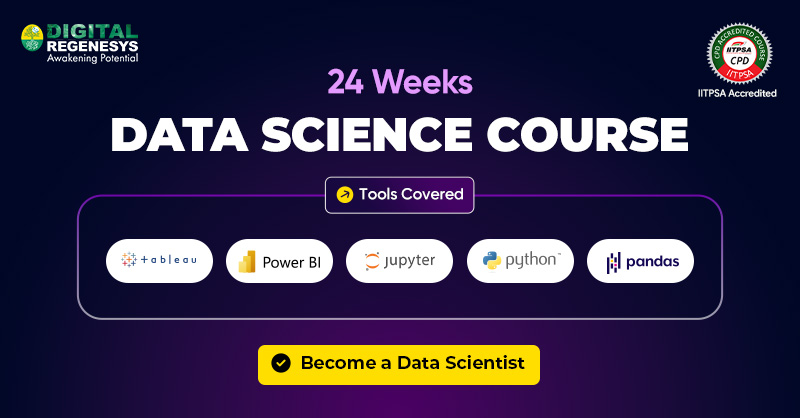Part-Time Data Science Course in SA: What You Should Know

Many people want to study data science but struggle to balance it with work, family, and other commitments. Flexible learning options enable you to acquire new skills without leaving your job or putting your personal life on hold.
This is where part-time formats become valuable for learners who need both flexibility and structure.
In this article, we will explore everything you need to know about a part-time data science course in SA. From evening and weekend formats to online study choices, you will see how these courses fit into a busy lifestyle.
We will also discuss what you can expect in terms of tools, return on investment, and time management. Whether you are a professional seeking a career shift or simply looking to add skills, this guide explains why a part-time approach makes sense.
Benefits of Part-Time Data Science Course in SA
Choosing a part-time data science course in SA means you can learn new skills without giving up your current job or lifestyle. It allows you to manage studies in smaller chunks while still progressing toward your career goals.
Here are the main benefits you can expect from this learning format:
1. Balance between work and study
Learners can continue their employment while improving their skills, reducing the risk of losing income during studies.
2. Practical application of knowledge
Since learners are working while studying, they can apply concepts like Python or Excel directly in their daily tasks.
3. Flexibility in scheduling
Options such as evening data science course in South Africa or weekend data classes provide study that fits into daily routines.
4. Steady progression
Short part-time data programs in SA ensure manageable learning without overwhelming pressure.
5. Cost-effectiveness
Spreading costs over several months makes part-time formats more affordable compared to full-time study.
Read more on What Factors Contribute To The Fees Of A Data Science Course?

Evening vs Weekend Data Science Course Options
Schedules vary for everyone, which is why a part-time data science course in SA often comes in both evening and weekend formats. Each option is designed to suit different lifestyles and study preferences.
Here are the main differences between evening and weekend classes:
|
Option |
Best For |
Structure |
Key Advantage |
|
Evening Classes |
Working professionals with daytime jobs |
Shorter sessions held after work hours |
Balance between work and study |
|
Weekend Classes |
Learners who prefer longer study blocks |
Full or half-day classes on weekends |
More time for in-depth practice |
|
Hybrid Options |
Those needing flexibility |
Mix of evening and weekend classes |
Customisable to personal schedule |
Online vs In-Person Part-Time Study
When selecting a part-time data science course in SA, another decision is whether to study online or attend in person. Both formats offer unique benefits, depending on your learning style and convenience.
Here are the study formats to consider:
- Online study: Remote part-time data learning in SA enables learners to attend classes from home, saving on travel time.
- In-person study: Face-to-face sessions provide learners with more opportunities to interact and network with their peers.
- Blended models: Many short part-time data programs in SA combine online modules with in-person workshops.
- Accessibility: Online options help a data course for busy people in SA reach learners across different regions.
Read more on What Does A Data Scientist Do- Know Their Roles & Responsibilities!
Job-Holder-Friendly Formats
A part-time data science course in SA is structured to support professionals who want to study while working. With flexible options, learners can build skills without disrupting their jobs.
Here is how such formats make studying easier for jobholders:
- Flexible timing: Courses are often offered during evenings, weekends, or in split sessions to accommodate work schedules.
- Structured learning: Even with flexibility, content is organised to help learners track steady progress.
- Support for professionals: Instructors offer guidance on balancing projects, coursework, and work demands.
- Focused content: A working professional data course in SA prioritises practical tools and case studies over heavy theory.
Tools Covered (Python, Excel, R)
Every part-time data science course in SA equips learners with hands-on training in tools that are widely used in the industry. These tools not only strengthen technical confidence but also ensure that learners can immediately apply theoretical concepts in real business or project scenarios.
Building proficiency in them makes interviews easier and daily tasks more efficient. Since most companies in South Africa value practical knowledge, exposure to these tools adds measurable career value.
Here are the essential tools covered:
- Python: A versatile programming language used for data cleaning, analysis, and machine learning projects. Its simplicity and broad community support make it an industry favourite.
- R: Ideal for statistical analysis and advanced visualisation, R helps learners explore datasets deeply and present insights clearly.
- Excel: Still a cornerstone for business reporting and data handling, Excel enables learners to manage, filter, and visualise day-to-day information quickly.
- NumPy: A powerful Python library that supports fast numerical computing and manipulation of large multi-dimensional arrays, crucial for advanced analytics and machine learning tasks.
Read more on How Long Does it Take to Become a Data Scientist- Enrol in Digital Regenesys’ 30-Week course!
Time Management Tips
Managing a part-time data science course in SA alongside work, family, and personal responsibilities can feel challenging at first. Many learners struggle not because of the difficulty of the subject, but because of time management issues.
A clear plan and consistent habits make it possible to stay on track without feeling overwhelmed. By creating a balance between study and other commitments, learners ensure steady progress and avoid last-minute stress. Good planning also helps maintain high motivation, as every small step contributes to overall success.
Here are practical tips for better time management:
- Set a study schedule: Allocate fixed study slots in your calendar each week. Treat these as non-negotiable appointments to build discipline and consistency.
- Prioritise key tasks: Work on assignments and exercises that develop high-impact skills, such as Python programming, Excel data handling, or SQL queries.
- Use breaks wisely: Even short study sessions during lunch or commuting hours can keep learning fresh and reduce workload buildup.
- Seek support: Share your study plan with family, friends, or colleagues so they can support you and minimise interruptions.
- Stay motivated: Mark small achievements, like completing a module or solving a practice question, to maintain enthusiasm throughout the course.
Read more on How to Get into Data Science? Skills, Qualifications and Career.
Return on Investment
A part-time data science course in SA offers significant advantages for professionals who want to grow their skills without pausing their careers. Many learners hesitate to pursue further studies because they fear losing income or falling behind at work.
With a flexible part-time option, it is possible to continue working while gaining in-demand technical knowledge. This balance enables learners to establish a solid foundation in data analysis, machine learning, and practical problem-solving, while continuing to advance in their current roles.
Over time, the benefits become clear in both career advancement and financial stability.
Here are the main ways such a course delivers returns:
- Career growth: Completing the course equips learners with competitive skills that open doors to higher responsibilities and advancement.
- Higher earning potential: Employers value professionals with data expertise, which can lead to salary increases and stronger job security.
- Practical outcomes: Learners can apply tools such as Python, SQL, and Power BI directly in their daily work, making the knowledge immediately useful.
- Cost savings: Choosing a part-time study path helps avoid the income loss that often comes with full-time courses.
Conclusion
A part-time data science course in SA provides the flexibility busy learners need to grow their skills. With evening, weekend, and online study options, professionals can keep working while mastering tools like Python, R, and Excel.
From case studies to time management strategies, the value of this flexible format is clear, making it a smart investment for long-term success.
Digital Regenesys offers a data scientist certificate course that suits professionals who want both flexibility and practical learning. The course is entirely online and covers Python, R, Excel, and SQL through hands-on projects.
This course is a strong choice for anyone considering short part-time data programs in SA. It combines structured learning with real-world application, helping learners apply skills immediately in their work.
To learn more, visit the Digital Regenesys website.
Last Updated: 25 September 2025
